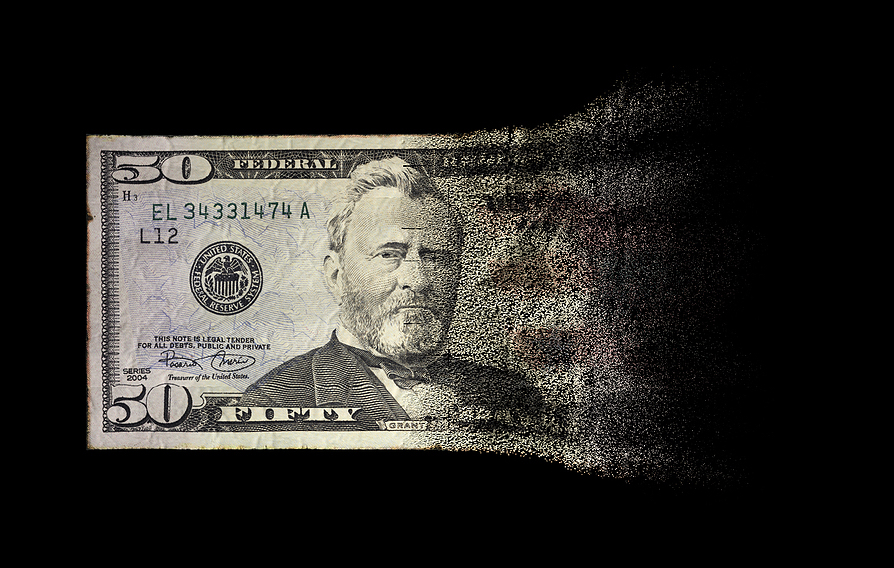In a strong economy, investing is relatively simple. Following traditional investment wisdom generally yields decent returns. However, most investors get tripped up when the economy hits rough patches. Mainstream advice presumes a strong dollar and low inflation which is really just a small fraction of market cycles. Knowing what investments to seek out during periods of economic downturn can put your portfolio in the best position for optimized protection and maximal growth.
The Relationship Between a Weak Dollar & High Inflation
A devalued dollar and high inflation are two sides of the same coin. Inflation is defined as the consistent increase in the general price of certain goods and services within the economy over an extended period. The direct result of this phenomenon is a decrease in purchasing power. In other words, the higher the inflation rate, the less valuable your dollar. The American people have seen this relationship play out over the past few years as inflation hit record highs and the dollar, along with dollar-backed assets, lost value.
What causes a weak dollar?
In today’s globalized, fiat money system, there are several factors influencing the value of the dollar. Any one of these factors or some combination of them can weigh on the greenback’s price.
Fed Policies
Central banks have significant leverage over the dollar’s value primarily through two means of intervention: interest rates and money supply. When the Fed wants to stimulate a stagnant economy, it might consider lowering interest rates and injecting more money into the economy. These policies often have the side effect of hampering the dollar by scaring investors away from devalued US assets and saturating the money supply.
“The Federal Reserve is starting to become concerned. They realize that they’re well behind the curve.”– Precious Metals Advisor Damian White
Foreign Central Banks
Although the Fed controls domestic fiscal policies, the actions of foreign governments can have detrimental effects on the dollar too. At times, governments engage in currency intervention by purposefully offloading their own currencies in exchange for US dollars. This can lead to a rapid increase in available USD on global markets, depreciating its value in comparison to other currencies. These economic measures are often taken by governments to increase the value of exports or improve currency stability.
De-Dollarization
The US dollar has been the world reserve currency for nearly five decades with the majority of foreign reserves being denominated in USD. However, a number of domestic fiscal blunders and geopolitical schemes have ramped up de-dollarization as countries actively decouple from the US dollar. Since much of the dollar’s value is shored up by these dollar reserves, the global shift away from the dollar severely impacts its value. With countries progressively growing bolder in their shifts away from the status quo, some experts warn of a dollar collapse.
Oil Prices
The near-universal demand for oil gives this commodity an outsized impact on the greenback’s value. In fact, ever since the gold standard was abandoned, the US dollar has been directly linked to oil through the petrodollar system – deepening the ties between oil and dollar markets. Typically, when oil prices dip due to demand slumps, oversupply, production booms, or technological advancements, the US dollar decreases in value. Of course, there are times when exceptional and unforeseen hikes in oil prices can result in a temporarily weak dollar.
Market Sentiments
The real x-factor influencing the value of the dollar is how people feel about the market. Studies have shown that humans often make irrational investment decisions based on emotions instead of carefully analyzed information. When market sentiment is cautious and pessimistic, investors usually pull out of traditional markets in favor of safe-haven investments . This immeasurable and largely unpredictable variable can lead to dollar devaluation regardless of market indicators.

Who benefits from a weak dollar?
The US dollar is the foundation of the global economic system which means most assets are linked to the greenback. As a result, a dip in the value of USD tends to sink the majority of investments. However, there are some countervailing assets that benefit from a weak dollar.
Foreign Governments
When the dollar experiences bouts of weakness, foreign currencies often see a surge in value. This imbalance puts foreign governments in an advantageous position to buy US goods and services at a discount, purchase Fed bonds at decent rates, and speed up domestic economic growth.
US Exporters
While a weak dollar is bad news for most domestic companies, it can act as a boon to large US exporters. As the dollar declines in value compared to other currencies, US products become considerably more affordable in foreign markets. This generates more sales and profits for foreign-focused companies.
Emerging Markets
Emerging markets tend to perform well during periods of dollar devaluation. This is especially true for the largest among these middle markets including China and Russia. In fact, the entire BRICS group, which is comprised of rapidly growing middle markets, has strategically placed itself in a position to capitalize on every dollar weakness.
👉 Suggested Reading: A BRICS Currency? The BRICS nations have even discussed the potential of a gold-backed BRICS currency to rival the dollar on the international stage.
Physical Asset Holders
Investors in hard assets are one of the biggest benefactors of a dollar decline. When the greenback shows signs of weakness, retail and institutional investors alike shift from paper-backed to physical assets. This is precisely why central bank gold demand has been skyrocketing. Unlike paper assets which are anchored to the US dollar, physical assets maintain strength due to their inherent value.
How to Invest With a Weak Dollar & High Inflation
Understanding who benefits from a weak dollar is worthwhile, but the fundamental question is what to own if the dollar collapses. There’s a reason retail investors, institutions, and governments have been turning to precious metals for centuries. These physical assets offer unrivaled protection against inflation and other economic pressures to preserve and even expand wealth. Gold and silver prices tend to have an inverse relationship with dollar prices, increasing when currency devalues.
If you’re interested in learning more about diversifying your portfolio with gold and silver, claim a FREE copy of our Precious Metals Investment Guide.


